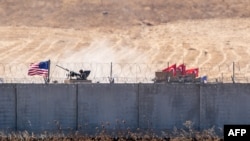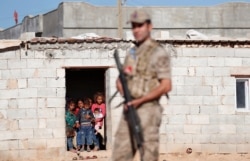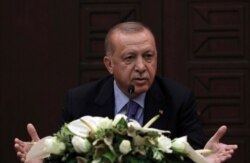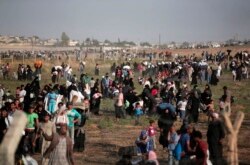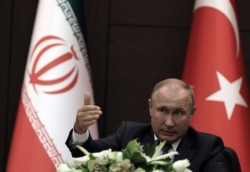Senior U.S. military officers claim "impressive" progress in cooperation with NATO ally Turkey in northeast Syria. But Turkish President Recep Tayyip Erdogan is warning of unilateral action against Washington's critical Syrian ally if Turkish security demands aren't met by the end of the month.
"I am constantly impressed by what the CJOC [Combined Joint Operation Center] has achieved in such a short period of time," said Brig. Gen. Christian Wortman in a briefing to journalists. "I would like to compliment our Turkish allies for their high levels of professionalism."
CJOC is based in Turkey's Sanliurfa province, which borders Syria. The command center was set up under an August agreement between U.S. and Turkish generals to create what Washington calls a "security mechanism," and what Ankara refers to a "safe zone," in northeast Syria.
Ankara claims the zone is necessary to protect its border from the Syrian Kurdish militia, the YPG, which it considers terrorists linked to an insurgency inside Turkey. The YPG is also a key ally in the Washington-led war against Islamic State.
"The intention of this 'security mechanism' is to address Turkey's legitimate security concerns and preserve conditions to continue cooperation to defeat ISIS, while fostering conditions that reduce the risk of violence and instability that would be counterproductive to all parties," said Wortman, U.S. director of CJOC.
Erodogan's frustration
On Wednesday, Erdogan again slammed the lack of progress, reiterating an ultimatum to Washington.
"We will initiate our plans in two weeks if no results come from the work with the United States on the formation of a safe zone," he said.
Washington is calling for patience.
"I can tell you that the United States is fully committed to addressing Turkey's legitimate security concerns," Wortman said. "This is a highly complex challenging environment, so full implementation is going to take time."
Analysts say the U.S. and Turkey also still remain at loggerheads over the details of the security arrangement. Erdogan wants to establish a 40-kilometer-deep Turkish-controlled zone into northeast Syria. Reports suggest Washington has agreed to a far more modest region of control.
"Our objective is to set up a 30- to 40-kilometer-deep safe zone along the borderline," Turkish Defense Minister Hulusi Akar said Thursday in an interview with the Turkish newspaper Turkiye.
U.S. officials speaking Thursday refused to be drawn into whether an agreement on the depth and control of any zone in Syria had been reached with Ankara.
Turkey's demand for a security zone in Syria is no longer just driven by security concerns and the perceived threat of the YPG.
"The mounting public resentment in Turkey towards [Syrian] refugees means solving the refugee problem in Turkey is as much a priority as security considerations for the government in driving its policy in northeast Syria," said Soli Ozel, an international relations teacher at Istanbul's Kadir Has University.
Resettlement
Turkey currently hosts around 3.5 million Syrian refugees. A recent poll found that over 80% of Turks wanted the refugees to leave. Erdogan is now presenting his planned "safe zone" as a solution to growing discontent.
"Depending on the depth of this safe zone, we can resettle 2 to 3 million displaced Syrians currently living in our country and Europe," Erdogan said.
Some analysts suggest the ongoing U.S.-Turkish tensions are increasingly centered on Erdogan's goal of resettling Syrians.
"On one hand, Turkish and U.S. militaries appear to be cooperating well, with frequent joint land and air patrols over the proposed zone," said analyst Atilla Yesilada of Global Source Partners. "However, Erdogan is very unhappy with the progress, accusing the U.S. of delaying tactics. He does so because Syrian Kurds who control the Turkish border are not willing to surrender control of the intended zone and their towns within to the Turkish military."
Critics accuse Turkey of seeking to use the Syrian refugees who are predominantly Arab to dilute the region's Kurdish population. Analysts claim demographics as an instrument of social policy is frequently employed in the area.
U.S. officials refused to be drawn into commenting on any mass refugee resettlement, other than reiterating general principles.
"The principles that we look for with refugees are safe, voluntary and dignified movements of refugees — that individuals are either moving home or a place of their choosing," Brig. Gen. Scott Naumann said in Thursday's journalist briefing.
Turkey could face resistance from Moscow and Tehran over any long-term plans for a military presence in Syria. Attending a three-way summit in Ankara on Monday, Russian President Vladimir Putin defended Turkey's right to protect its borders against any security threat. But Putin insisted any intervention must end once the threat is dealt with, reaffirming his commitment to Syria's territorial integrity.
Akar announced plans Thursday for permanent military bases in northeast Syria.
"They will be the joint bases of Turkey and the U.S. We want them to be permanent. Their numbers will be decided depending on the need," he said.
U.S. officials Thursday refused to comment on Akar's claim, saying it does not comment on future operations. Analysts say the current disputes are expected to be addressed when Erdogan meets next week with President Donald Trump on the sidelines at the United Nations General Assembly.




